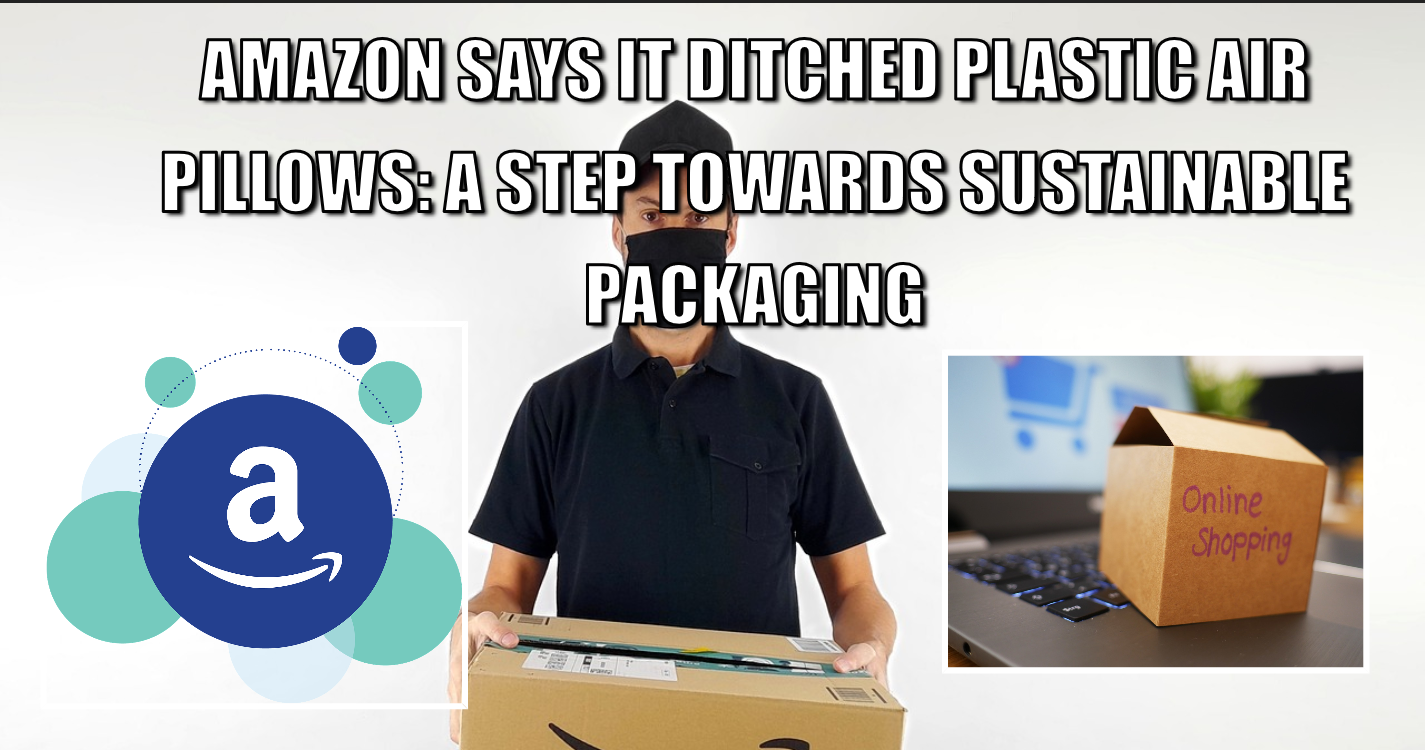Amazon Says It Ditched Plastic Air Pillows: A Step Towards Sustainable Packaging
In a world increasingly focused on sustainability, the news that Amazon has eliminated plastic air pillows from its packaging is a significant development. This decision not only reflects a growing awareness of environmental issues but also highlights the need for larger corporations to take responsibility for their impact on the planet. This article explores the implications of this move, the benefits of sustainable packaging, and the broader context of corporate responsibility in the fight against plastic pollution.

Understanding Plastic Air Pillows
Plastic air pillows are often used in shipping to fill empty space in packages, protecting items from damage during transit. While they are lightweight and effective at cushioning products, they are typically made from polyethylene, a type of plastic that contributes to environmental pollution. Once discarded, these air pillows can take hundreds of years to decompose, often ending up in landfills or the ocean, where they pose a threat to wildlife and ecosystems.
The Environmental Impact of Plastic
Plastic pollution has reached alarming levels, with millions of tons of plastic entering the oceans each year. This not only harms marine life but also disrupts entire ecosystems. The United Nations estimates that by 2025, there could be more plastic in the ocean than fish. This reality has prompted calls for more sustainable practices, particularly from major corporations that produce a significant amount of waste.
Amazon’s decision to ditch plastic air
pillows is a response to these growing concerns. By eliminating a product that has become synonymous with wasteful packaging, the company is taking a stand against plastic pollution and leading the way for other retailers to follow.
The Benefits of Sustainable Packaging
1. **Environmental Preservation**: By transitioning to more sustainable packaging alternatives, companies can significantly reduce their environmental footprint. Sustainable materials are often biodegradable or recyclable, ensuring that they do not contribute to long-term waste.
2. **Consumer Preference**: As awareness of environmental issues grows, consumers are increasingly looking for brands that align with their values. A commitment to sustainability can enhance a company’s reputation, attracting environmentally conscious customers.
3. **Regulatory Compliance**: Governments worldwide are beginning to impose stricter regulations on plastic use. By adopting sustainable practices now, companies can stay ahead of potential legislation and avoid future penalties.
4. **Cost Savings**: In many cases, sustainable packaging can be more cost-effective in the long run. While the initial investment may be higher, companies can save on disposal costs and potentially lower shipping expenses by using lighter, more efficient materials.
Amazon’s Sustainable Packaging Initiatives
Amazon’s decision to phase out plastic air pillows is just one aspect of its broader commitment to sustainability. The company has announced several initiatives aimed at reducing its environmental impact:
1. **Frustration-Free Packaging**: Amazon’s Frustration-Free Packaging program encourages manufacturers to use recyclable materials and design packages that are easy to open. This not only reduces waste but also improves the customer experience.
2. **The Shipment Zero Initiative**: Amazon aims to make all of its shipments net-zero carbon by 2040. This ambitious goal includes investments in renewable energy, electric delivery vehicles, and innovative packaging solutions.
3. **Collaboration with Partners**: Amazon is working with brands and suppliers to develop sustainable packaging solutions. By collaborating with industry partners, the company can drive innovation and promote best practices across the supply
chain.
4. **Education and Awareness**: Amazon is also focusing on educating consumers about sustainable packaging options. By raising awareness of the environmental impact of packaging, the company hopes to encourage more responsible consumer behavior.
Challenges Ahead
While Amazon’s decision to ditch plastic air pillows is a positive step, the journey towards sustainable packaging is fraught with challenges. Transitioning to alternative materials can be complex and costly. Companies must carefully consider the performance, cost, and environmental impact of new packaging options.
Additionally, there is the challenge of consumer behavior. While many people express a desire for sustainable practices, actual purchasing decisions may not always align with these values. Companies must find ways to balance sustainability with convenience and cost-effectiveness to meet consumer expectations.
The Role of Consumers
Consumers play a crucial role in driving the d
emand for sustainable practices. By choosing to support brands that prioritize sustainability, individuals can influence corporate behavior. Public pressure can encourage companies to adopt more environmentally friendly practices, leading to industry-wide changes.
Moreover, consumers can contribute to sustainability efforts by properly disposing of packaging materials. Understanding recycling guidelines and making informed choices can help mitigate the impact of packaging waste on the environment.
The Broader Con
text of Corporate Responsibility
Amazon’s decision to eliminate plastic air pillows is part of a larger trend in corporate responsibility. Companies across various industries are recognizing the importance of sustainability, not just for the environment, but also for their long-term viability.
In a global economy increasingly focused on social and environmental issues, businesses that fail to adopt sustainable practices risk losing their competitive edge. Investors, customers, and employees are increasingly looking for companies that demonstrate a commitment to corporate social responsibility (CSR).
Conclusion
Amazon’s decision to ditch plastic air pillows is a landmark move in the ongoing effort to combat plastic pollution. By prioritizing sustainable packaging, the company is not only reducing its environmental impact but also setting an example for other businesses to follow.